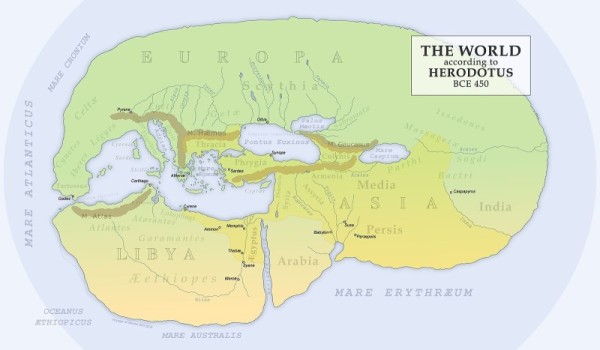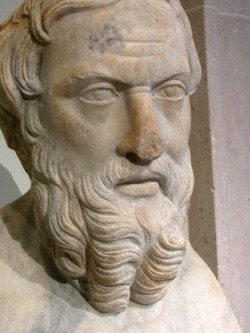Then great numbers were gathered at Kyrene, and the Libyans who dwelt round had much land cut off from their possessions . . . .

Translated by George C. Macaulay — our special project presenting the complete Herodotus with URLs for all of those people, places, events, and things which baffles and discourages modern readers.
Previously on Herodotus
159. Now during the lifetime of the first settler Battos, who reigned forty years, and of his son Arkesilaos, who reigned sixteen years, the Kyrenians continued to dwell there with the same number as when they first set forth to the colony; but in the time of the third king, called Battos the Prosperous, the Pythian prophetess gave an oracle wherein she urged the Hellenes in general to sail and join with the Kyrenians in colonising Libya. For the Kyrenians invited them, giving promise of a division of land; and the oracle which she uttered was as follows:
Who to the land much desirèd, to Libya, afterwards cometh, After the land be divided, I say he shall some day repent it.
Then great numbers were gathered at Kyrene, and the Libyans who dwelt round had much land cut off from their possessions; therefore they with their king whose name was Adicran, as they were not only deprived of their country but also were dealt with very insolently by the Kyrenians, sent to Egypt and delivered themselves over to Apries king of Egypt. He then having gathered a great army of Egyptians, sent it against Kyrene; and the men of Kyrene marched out to the region of Irasa and to the spring Theste, and there both joined battle with the Egyptians and defeated them in the battle: for since the Egyptians had not before made trial of the Hellenes in fight and therefore despised them, they were so slaughtered that but few of them returned back to Egypt. In consequence of this and because they laid the blame of it upon Apries, the Egyptians revolted from him.
160. This Battos had a son called Arkesilaos, who first when he became king made a quarrel with his own brothers, until they finally departed to another region of Libya, and making the venture for themselves founded that city which was then and is now called Barca; and at the same time as they founded this, they induced the Libyans to revolt from the Kyrenians. After this, Arkesilaos made an expedition against those Libyans who had received them and who had also revolted from Kyrene, and the Libyans fearing him departed and fled towards the Eastern tribes of Libyans: and Arkesilaos followed after them as they fled, until he arrived in his pursuit at Leucon in Libya, and there the Libyans resolved to attack him. Accordingly they engaged battle and defeated the Kyrenians so utterly that seven thousand hoplites of the Kyrenians fell there. After this disaster Arkesilaos, being sick and having swallowed a potion, was strangled by his brother Haliarchos, and Haliarchos was killed treacherously by the wife of Arkesilaos, whose name was Eryxo.
161. Then Battos the son of Arkesilaos succeeded to the kingdom, who was lame and not sound in his feet: and the Kyrenians with a view to the misfortune which had befallen them sent men to Delphi to ask what form of rule they should adopt, in order to live in the best way possible; and the Pythian prophetess bade them take to themselves a reformer of their State from Mantineia of the Arcadians. The men of Kyrene accordingly made request, and those of Mantineia gave them the man of most repute among their citizens, whose name was Demonax. This man therefore having come to Kyrene and having ascertained all things exactly, in the first place caused them to have three tribes, distributing them thus: one division he made of the Theraians and their dependants, another of the Peloponnesians and Cretans, and a third of all the islanders. Then secondly for the king Battos he set apart domains of land and priesthoods, but all the other powers which the kings used to possess before, he assigned as of public right to the people.

CC BY-SA 2.0 image from Wikipedia.
162. During the reign of this Battos things continued to be thus, but in the reign of his son Arkesilaos there arose much disturbance about the offices of the State: for Arkesilaos son of Battos the Lame and of Pheretime said that he would not suffer it to be according as the Mantineian Demonax had arranged, but asked to have back the royal rights of his forefathers. After this, stirring up strife he was worsted and went as an exile to Samos, and his mother to Salamis in Cyprus. Now at that time the ruler of Salamis was Euelthon, the same who dedicated as an offering the censer at Delphi, a work well worth seeing, which is placed in the treasury of the Corinthians. To him having come, Pheretime asked him for an army to restore herself and her son to Kyrene. Euelthon however was ready to give her anything else rather than that; and she when she received that which he gave her said that this too was a fair gift, but fairer still would be that other gift of an army for which she was asking. As she kept saying this to every thing which was given, at last Euelthon sent out to her a present of a golden spindle and distaff, with wool also upon it: and when Pheretime uttered again the same saying about this present, Euelthon said that such things as this were given as gifts to women and not an army.
163. Arkesilaos meanwhile, being in Samos, was gathering every one together by a promise of dividing land; and while a great host was being collected, Arkesilaos set out to Delphi to inquire of the Oracle about returning from exile: and the Pythian prophetess gave him this answer:
For four named Battos and four named Arkesilaos, eight generations of men, Loxias grants to you to be kings of Kyrene, but beyond this he counsels you not even to attempt it. Thou however must keep quiet when thou hast come back to thy land; and if thou findest the furnace full of jars, heat not the jars fiercely, but let them go with a fair wind: if however thou heat the furnace fiercely, enter not thou into the place flowed round by water; for if thou dost thou shalt die, both thou and the bull which is fairer than all the rest.
– Herodotus, Book IV
| <—Previous | Master List | Next—> |
Herodotus made his living by being interesting. In a world where most people did not read and could not afford to buy a book even if they could, they would pay to listen to Herodotus recite from his books. They would not pay to be bored. In that world, the names that populate his stories would have some general familiarity to his audience. Their obscurity to us is a barrier that this series seeks to break down.
MORE INFORMATION
MAP LIBRARY
Because of lack of detail in maps as embedded images, we are providing links instead, enabling readers to view them full screen.

Leave a Reply
You must be logged in to post a comment.